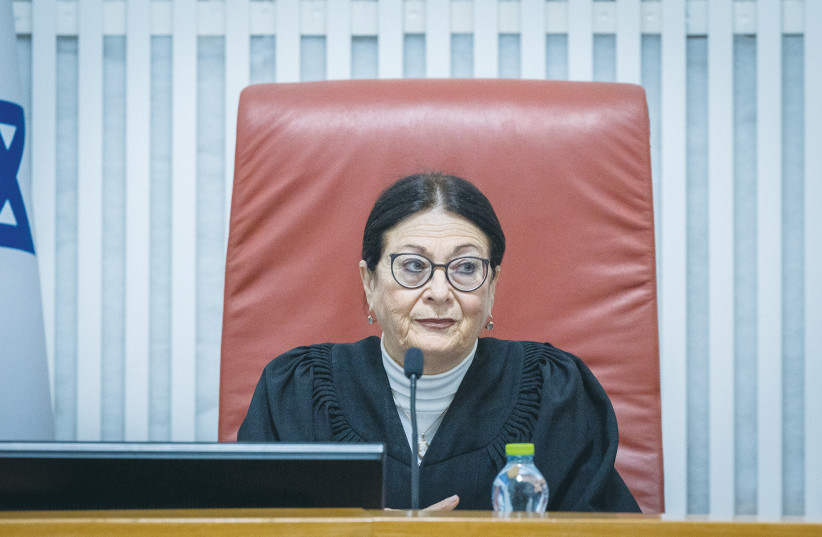In the ongoing debate over reforms designed to weaken the Supreme Court of Israel, there is considerable confusion about their effect on democracy, as distinguished from minority rights and civil liberties. Democracy, legally defined, means majority rule. Israel will remain a parliamentary democracy in which a fairly elected majority decides fundamental issues of policy, even if ill-advised judicial reforms are enacted.
It will not become like apartheid South Africa or authoritarian Turkey or Hungary, where minority dictators make the decisions. It will, however, become a democracy less sensitive to minority rights and civil liberties.
In an important respect, there is an inherent conflict between democracy and the protection of minority rights. When the rights of minorities prevail over the will of the majority – as they should in certain areas, such as free speech and the non-establishment of religion – democracy is compromised.
The US also isn't a democracy
The United States, for example, is not a democracy. It is a republic with structural checks on democracy. The Electoral College, the Senate and the Bill of Rights are all part of our counter-majoritarian system of checks and balances designed to limit the excesses of majority rule when it comes to conflict with minority rights, such as free speech for unpopular dissents.
Nor is Israel a pure democracy with or without the proposed judicial changes. The threshold for Knesset qualification, the reality of the coalition system, the role of the security cabinet and other constraints on simple majority rule make it like other parliamentary systems: essentially but not completely democratic. Indeed, since the time of Athens, there has not been a perfect democracy.

In some such systems, the courts can review and overrule parliamentary votes and in some, they can’t. In some, the parliament can override judicial decisions and in others, it can’t. Permitting an override or denying judicial review does not make parliamentary democracies undemocratic or tyrannical, it merely makes them less sensitive to minority rights and civil liberties. It is a matter of striking the right balance.
Majority and minority rights
DIFFERENT DEMOCRACIES strike the balance between majority and minority rights differently. Israel has generally struck it quite appropriately during its first 75 years. The proposed judicial reform threatens to skew the balance away from minority rights and civil liberties. It is, of course, largely a matter of the degree to which reasonable citizens can and do differ. But it is an important matter of degree that may shape the future of Israel.
Both in the United States and in Israel, the power of the judiciary to overrule legislative – of the majority – decisions is under attack. The hard Left in America is trying to weaken the current Supreme Court by packing it, limiting its jurisdiction and imposing term and/or age limits. The current attack has been stimulated by a series of High Court decisions that favor the Right. In Israel, the attack is based on decisions that purportedly favor the Left.
In both instances, wrong-headed and permanent structural changes are being proposed in response to short-term dissatisfaction with the current directions of the courts. In both instances, the so-called reforms will endanger the checks and balances that help democracies govern fairly. In both instances, they should be opposed by those who favor democracy and civil liberties.
They should also be opposed by those who case about Israel’s standing in the international community and especially before the International Criminal Court and other judicial and quasi-judicial bodies. To be sure, Israel will continue to be subjected to a double standard regardless of what it does.
But those of us who defend Israel in these bodies, as well as in the court of public opinion, have long relied on a strong Supreme Court that protects human rights. We will continue to defend Israel against unfair attacks but our job will become even harder if the judiciary and civil liberties are weakened.
There are reforms that can be enacted without harming civil liberties. The jurisdiction of the Supreme Court could be reduced over essentially political issues, such as the gas deal with Lebanon or whether particular politicians are eligible to serve in the government. If an override were limited to these and other non-civil liberties issues, they would be less objectionable but if a simple Knesset majority could override the judicial protection of fundamental rights such as equality, due process, free speech and the like, Israel would be the worse for it.
Today such an override may help the Right; tomorrow it may hurt the Right. In the end, it would endanger the liberties of all Israelis.
The writer is Felix Frankfurter Professor of Law, emeritus. He is the author of The Price of Principle: Why Integrity is Worth the Consequences (2022). His new podcast is The Dershow, on Spotify, YouTube and iTunes.
